- Home
- Deborah Harkness
Time's Convert Page 19
Time's Convert Read online
Page 19
“The Associators take care of their own,” Cuthbert murmured in Marcus’s ear. “You’re one of us now.”
For the first time since leaving Joshua and Zeb in Hadley, Marcus felt that he belonged.
* * *
—
SEVERAL DAYS AFTER being hauled before Moulder, Marcus and Vanderslice were sharing what qualified as a fire in Washington’s winter encampment: a pile of damp logs that smoked and gave off very little heat. He had no feeling in his fingers or toes, and the air was so cold that it seared the skin before burning a pathway into his lungs.
The frigid temperatures made conversation difficult, but Vanderslice was undeterred. The only topic that the boy refused to discuss was his life before he became part of the Philadelphia artillery company. This was the root of the friendship that had sprung up between Marcus and Vanderslice. While most of the soldiers talked about nothing but their mothers, the girls they’d left behind, and male relatives who were fighting for Washington in other regiments, it was as though Marcus and Vanderslice had been born in November and only remembered life with the Associators: their retreat from Manhattan following the loss of Ft. Washington, the battle at Trenton at Christmas, and the most recent battle near the college at Princeton.
“‘Two angels came down from the north; / one named Fire, the other Frost; / Frost said to Fire go away, go away; / in the name of Jesus go away,’” Vanderslice said, blowing on his cold-reddened fingers. He had only one glove, and kept swapping it back and forth between his hands.
“Wonder if we could expel the cold if we said it backward.” Marcus burrowed into the woolen muffler he’d taken off a dead soldier after the battle at Princeton.
“Probably. Prayers have power,” Vanderslice replied. “Do you know any others?”
“Frostbite in January, amputate in July.” It was more of a prophecy than a prayer, but Marcus shared it anyway.
“You can’t fool me, Yankee. You didn’t learn that in church.” Vanderslice reached into his pocket and pulled out a small flask. “Want a nip of rum? It’s got gunpowder in it, to give you courage.”
Marcus took a precautionary sniff.
“You’ll shit your brains out if you drink any more of that,” he said, returning the flask to Vanderslice. “It’s castor oil.”
Lieutenant Cuthbert strode toward the fire, attracting the attention of the other Associators who gathered around to see what was afoot.
“You’re in a hurry,” Adam Swift remarked in his decidedly Irish drawl. He had been one of the first to sign up when the Associators were established, and was Cuthbert’s de facto second-in-command.
“We’re going home.” Cuthbert quickly hushed the cries of relief. “I heard it from one of the whores, who learned it from one of Washington’s aides, who heard the general talking to the other officers.”
Conversation burst out between members of the regiment as they began making plans for what they’d do once they were back home. Marcus shivered as the cold whistled through his coat. Philadelphia was no home to him. He would have to find another regiment to join—and soon. Maybe he would have to change his name again. If Washington was breaking up their winter camp and sending everyone back home, Marcus would need somewhere to go.
“You coming with us, Doc?” Swift elbowed Marcus in the ribs.
Marcus smiled and nodded, but there was a cold knot in his stomach. He didn’t have any skills that would be useful in Philadelphia. There wouldn’t be farm work until spring.
“Of course Doc is coming. He’s going to hang a shingle outside German Gerty’s and sell his medical services,” Cuthbert said. “I’ll stand outside and testify to your skill.” He held up his thumb.
“Let me see that.” Marcus stood, his cold joints creaking at the change in position. What he wouldn’t give for some of Tom Buckland’s liniment to soothe the ache in his bones.
Obediently, Cuthbert offered his hand to Marcus. Marcus looked at it closely, pushing up Cuthbert’s sleeve to examine the arm as well. At Princeton, Cuthbert had grabbed the wrong end of a gun brush, and some of the wire had become embedded in his thumb. It was still angry and red, but not nearly as swollen as it had been.
“No red streaks. That’s good—no infection.” Marcus probed the skin around the wound. There was a bit of discharge, but not much. “You must have the constitution of an ox, Lieutenant.”
“You there!” A small, elderly man in a wig that was at least forty years out of style pointed in Marcus’s direction. “Who are you?”
“Galen Chauncey,” Marcus said as confidently as he could. Cuthbert cut him a shrewd glance.
“You are the regimental surgeon for these men?” The longer the man’s sentences, the more evident his German accent became, all the th’s turning into soft d’s.
Sensing a potential crisis, Cuthbert turned on his considerable charm. “How can I help, Mr. . . . ?”
“Dr. Otto,” the man said, planting his feet wide. “This is a Pennsylvania company, ja?”
“Yes,” Cuthbert admitted.
“I am chief surgeon for the Pennsylvania companies, and I do not know this man.” Otto sized up Marcus from head to toe. “He does not look like one of us. That shirt is very odd.”
“Doc’s not odd. He’s a Yankee, that’s all,” said Swift.
Marcus glared at him. That was not something he wanted officers to know.
“Doc?” Otto’s voice rose.
“Not exactly,” Marcus said hastily. “I learned some tricks of healing from a friend back home, that’s all.”
“Tricks?” Otto’s voice was now as high as his eyebrows.
“Skills,” Marcus corrected himself.
“If you are so skilled, then what are the healing properties of mercury?” Otto demanded.
“Treating lesions on the skin,” Marcus said, happy to remember some of what he’d learned from Tom’s medical books.
“And why would you administer calomel and jalap?”
“To purge the bowels,” Marcus replied promptly.
“You know of Dr. Rush’s methods, I see. And what do you know of Dr. Sutton?” Dr. Otto’s dark eyes fixed intently on Marcus.
“I know he charges too much for ordinary people to afford his services,” Marcus said, tired of the inquisition. He pushed up his sleeve. The puckered scar from his own inoculation was still visible on his arm, and likely would be for his whole life. “And I know his method works. Any other questions?”
“No.” Otto blinked. “You will come with me.”
“Why?” Marcus asked warily.
“Because, Herr Doc, you are going to work for me now. You should not be behind a gun, but in the hospital,” Otto said.
“But I belong to them.” Marcus looked to the men in his company for support, but Cuthbert just shook his head.
“It will be months before we’re on the battlefield again,” Cuthbert said. “You can do more for the cause of liberty with the doctor than you can drinking the winter away with Vanderslice and Swift.”
“What are you waiting for, Herr Doc?” Dr. Otto demanded. “I gave you an order. Get your pack, and bring your blanket. All of mine are on the sick soldiers.”
After Hadley, Marcus’s life path had been as twisted and dark as a forest trail. It had led him through New England and into New York, skirting the edges of battle while constantly afraid of being captured as a deserter or a spy or a murderer. Then the Associators had let him join their ranks, and Marcus had been able to see a few miles ahead into December and now January.
But the Associators were all returning to the comforts of home. His life was taking another strange turn, thanks to this odd little German doctor, who was plucking him out of the crowded, smoky conditions of the camp only to thrust him into the bloody world of what passed for hospitals in Washington’s army. For Marcus, it was a chance to escape even further fr
om what had happened in his past. He remembered what Sarah Bishop had told him at Bunker Hill: that the army was going to need healers more than it needed fighters.
Still, Marcus hesitated, standing at this unexpected fork in the road.
“Go on,” Swift said, tossing Marcus’s heavy haversack to him. “Besides, if you don’t like it, you can find us at German Gerty’s tavern most days. It’s down on the Philadelphia docks. Anyone can point the way.”
* * *
—
WHEN HE LEFT the Associators’ fire, Marcus finally saw Washington’s army laid out in all its confusing squalor. Until today, he had not explored the rest of camp for fear that he might see someone from Massachusetts—but that seemed unlikely given the fact that it had a population to rival some big towns, and the layout was just as confusing. Dr. Otto seemed to know every alley and byway, however, and moved with assurance through the troops, their smoking fires, and the torn and stained flags that proudly flew at the center of each company to identify which patch of frozen ground belonged to Connecticut and which to Virginia.
“Fools,” Otto muttered, slapping away a standard for a New Jersey regiment that was snapping in the cold wind.
“Excuse me?” Marcus was struggling to keep up with the old man’s pace.
“So busy fighting each other, it is no wonder the British have been winning.” Otto noticed a soldier sitting on a fallen log, his leg blackened and oozing. “You there. Have that leg seen to by your surgeon or you will lose it, ja?”
Marcus shot a quick glance at the suppurating leg. He’d never seen anything so gruesome. What had the man done to cause such an injury?
“Burned with powder, then marched through the cold on poor rations. And no shoes!” Otto continued through the camp, his accent growing thicker with each step. “Idiocy. Sheer madness. Soon the Big Man will have no army left.”
Marcus assumed the Big Man was Washington. He had seen the general three times: once on his horse overlooking the Hudson River as Ft. Washington fell to the Hessian troops, again at Trenton when he climbed into a boat to cross the Delaware, and a third time in Princeton when Washington had nearly been shot by one of his own cannon. Washington towered over the rest of his men on foot, but on a horse, he was like one of the heroes of old.
“One army. One camp. One medical service. This is the way to win a war,” Otto muttered. “Connecticut has medicine chests, but no medicines. Maryland has medicine, but no bandages. Virginia has bandages, but no chests to store them in, so they have been ruined. Around and around we go. Madness.”
Dr. Otto stopped abruptly and Marcus ran into him, almost knocking the doctor off his feet.
“I ask you, how are we supposed to heal these men if Washington will not listen?” Otto demanded. His wig tipped to one side as if it, too, were considering the question.
Marcus shrugged. Otto sighed.
“Exactly,” he said. “We must do what we can, in spite of the lunatics.”
“That’s been my experience, sir,” Marcus said, hoping to soothe the irascible German.
Otto looked sour, but they had at last reached their destination: a large tent on the outskirts of the encampment. Beyond it was Morristown. Marcus had noted the town’s prosperity and the hum of business that surrounded it, even in the depths of war and winter.
Around the tent, men loaded boxes onto wagons and unloaded more boxes from carts coming in from the countryside. A troop of local boys was splitting an enormous pile of logs into wood for the fires. Women stirred cauldrons of steaming water filled with sodden blankets.
A tired-looking man in a bloodstained apron was sitting on an overturned bucket, smoking a pipe.
“This is my new surgeon’s mate, Dr. Cochran,” Dr. Otto said. “His name is Margalen MacChauncey Doc. It sounds Scottish, ja?”
“Scottish? No, I don’t think so, Bodo,” Dr. Cochran said with a thick burr that reminded Marcus of his grandfather MacNeil. “Where are you from, boy?”
“Mas—Philadelphia.” Marcus caught himself just in time. A slip like that could cost him his life, if someone with an active curiosity were to hear it.
“He sounds foreign to me,” Otto said in his thick accent. “Some boys from Philadelphia said he was a Yankee, but I do not know whether to believe them.”
“He might well be.” Cochran studied Marcus closely. “Yankees do have very strange names. I’ve heard some called Submit and Endeavour and Fortitude. Does he have any experience? He looks too young to know much, Bodo.”
Marcus bristled.
“He is familiar with the methods of Dr. Rush,” Otto said, “and how to empty a man’s bowels most forcefully.”
“Hmph,” Cochran replied, drawing on his pipe. “We don’t need any help with that. Not in this army.”
“The boy has heard of Dr. Sutton, too.” Dr. Otto blinked like one of the owls that roosted in their barn in Hadley.
“Is that so?” Cochran’s tone was speculative. “Well, then. Let’s see if he knows something more useful than one of Dr. Rush’s extreme cures. If your patient was complaining of rheumatism and pain in the joints, how would you induce a sweat, boy?”
More questions. Marcus would rather be back among the Associators than be grilled and scolded like a schoolboy by the army surgeons.
“I’d have him examined by a committee of medical officers, Dr. Cochran,” Marcus retorted. “And the name is Mr. Chauncey, if you please.”
Cochran bellowed with laughter.
“What do you think, Dr. Cochran? Did I not find us a suitable replacement for that frightened young man who ran off at Princeton?” Otto asked.
“Aye. He’ll do.” Cochran tamped down on the tobacco in his pipe and slipped it into his pocket. “Welcome to the army’s medical corps, Doc—or whatever your name is.”
For the second time in his short life, Marcus shed one identity and adopted another.
* * *
—
TIME PASSED DIFFERENTLY in the medical corps than it had on the farm in Hadley (where nothing seemed to change except the seasons), or in his life as a fugitive (where every day was different), or the brief period among the Associators (when time passed so quickly that you didn’t have the opportunity to think). In the army’s temporary hospital in Morristown, time passed in a never-ending stream of wounds and illnesses that flowed among tables and cots, crates of bandages, and boxes of medicines. No sooner did a new patient arrive than a former patient left. Some left in pine boxes, destined for the graveyard dug on the outskirts of town. The more fortunate were sent home to convalesce from broken limbs and gunshot wounds or cases of dysentery. Others languished on the wards, poorly fed and poorly housed, unable to die, yet equally unable to heal.
As the newest recruit, Marcus had first been posted to the part of the hospital reserved for men with minor injuries and ailments. There his jobs were menial, requiring no medical knowledge whatsoever. His duties did provide a way for him to learn the rhythms of this new environment and to develop his skills. Marcus was learning how to diagnose patients by carefully watching their restless limbs, the pace of their breathing as they dreamed, and the spots of color that often appeared in the middle of the night and indicated that infection was taking root in the body.
The moonlit hours also provided Marcus with an opportunity to eavesdrop on the senior medical officers, who would gather by the ancient, inefficient stove to talk when the wards were quiet, their patients had sunk into whatever troubled sleep their injuries allowed, and only a skeleton crew of low-ranking surgeons’ mates like Marcus were present.
Cochran was smoking his pipe—something he did whenever he had an opportunity, even in the midst of a surgical procedure. Otto was rocking slowly in a chair with uneven runners, which made him look like he was riding a lame hobbyhorse.
“If we are to remain at Morristown, there must be proper housing, with
latrines dug farther away from the soldiers,” Dr. Otto said. “Dysentery and typhus are more deadly than any British bullet.”
“Watery bowels, like the itch, are fixtures of army life. The smallpox, on the other hand . . .” Cochran trailed off into silence. He puffed on his pipe, the smoke wreathing his head. “We will have to inoculate them all, Bodo—every last one of them—or the whole army will be dead by the spring thaw.”
“There is nothing quick in army life, except for retreats,” Dr. Otto observed.
Marcus snorted in agreement, then tried to cover it up with a fit of coughing.
“We are aware that you can hear us, Mr. Doc,” Otto said sharply. “You are like one of the Big Man’s dogs, always watching and listening. But these are good traits in a doctor, so we let you do it.”
“Washington tells me that I will soon to go into Pennsylvania to open a hospital there. But if the general agrees to inoculate the entire army, as we hope, the burden will fall largely on your shoulders at Trenton, Bodo,” Dr. Cochran said, returning to their conversation.
“Das ist mir Wurst, my friend,” Otto replied. “I have my sons to help—unless you wish to take them with you instead.”
All three of Dr. Otto’s sons were medical men, carefully trained by their father to treat a variety of common ailments as well as undertake surgical procedures. They could concoct medicines, suture wounds, and diagnose patient complaints. Marcus had seen them working in the wards, following their father like a flock of devoted chicks, and had been amazed by their quiet competence in the face of the most gruesome injuries.
“I thank you, Bodo, but my staff did not abandon their patients and go home, as so many others did. I am well served, at present.” Cochran angled his head in Marcus’s direction. “What will you do with him?”
“Take him to Trenton, of course, and see if we can make him a doctor in truth as well as in name,” Dr. Otto replied.
* * *

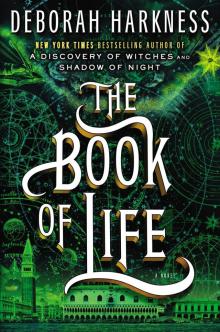 The Book of Life
The Book of Life Shadow of Night
Shadow of Night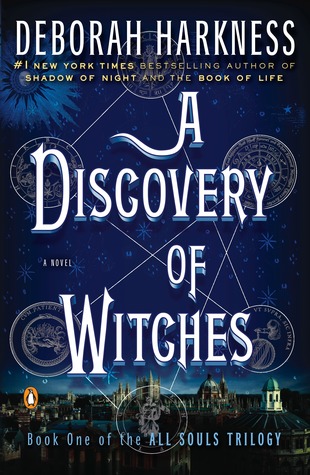 A Discovery of Witches
A Discovery of Witches The All Souls Real-Time Reading Companion
The All Souls Real-Time Reading Companion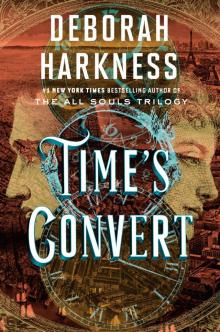 Time's Convert
Time's Convert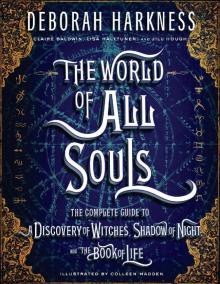 The World of All Souls
The World of All Souls A Discovery of Witches: A Novel (All Souls Trilogy)
A Discovery of Witches: A Novel (All Souls Trilogy)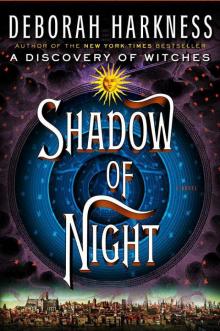 Shadow of Night: A Novel
Shadow of Night: A Novel